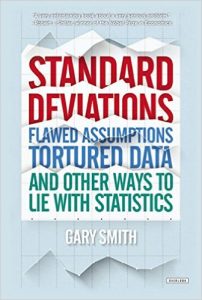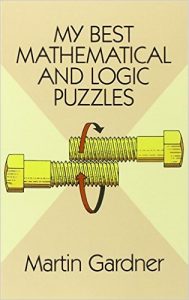Gary Smith is my kind of curmudgeon. This book is basically a long set of essays on how people screw up their stats. Sometimes this is particular complaints about particular (often famous) scholars. Sometimes it’s discussion of common  conceptual errors. I especially enjoy how pretty much nobody is spared, from politicians to famous scholars, to beloved intellectuals like Steve Levitt of “Freakonomics” fame.
conceptual errors. I especially enjoy how pretty much nobody is spared, from politicians to famous scholars, to beloved intellectuals like Steve Levitt of “Freakonomics” fame.
If you’re into turning a skeptical eye on everything, or if you want to learn how to think more clearly about science, the news, politics, economics, and anywhere else people are likely to abuse stats, this is a a great book for you.

 only complaint (and, it’s a bullshit complaint) is that I really prefer a particular type of puzzle – the kind that is simple enough to easily hold in one’s head, and which doesn’t benefit from having pencil and paper. Some of the puzzles had interesting results, but really just required you to sit and write out a little algebra.
only complaint (and, it’s a bullshit complaint) is that I really prefer a particular type of puzzle – the kind that is simple enough to easily hold in one’s head, and which doesn’t benefit from having pencil and paper. Some of the puzzles had interesting results, but really just required you to sit and write out a little algebra.